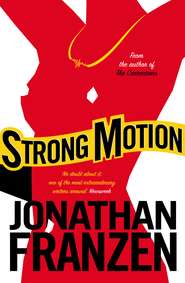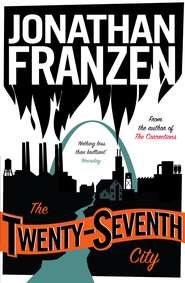По всем вопросам обращайтесь на: info@litportal.ru
(©) 2003-2024.
✖
The Corrections
Автор
Год написания книги
2018
Настройки чтения
Размер шрифта
Высота строк
Поля
“Listen,” Chip said with a nervous smile, not looking at her. “I need to ask you a big favor. I need you to hold the fort for me here while I find Eden and get my script back. There’s a major, quick set of corrections I have to make.”
As if he were a caddie or a servant, Denise handed him her umbrella and brushed water and grit from the ankles of her jeans. Denise had her mother’s dark hair and pale complexion and her father’s intimidating air of moral authority. She was the one who’d instructed Chip to invite his parents to stop and have lunch in New York today. She’d sounded like the World Bank dictating terms to a Latin debtor state, because, unfortunately, Chip owed her some money. He owed her whatever ten thousand and fifty-five hundred and four thousand and a thousand dollars added up to.
“See,” he explained, “Eden wants to read the script this afternoon sometime, and financially, obviously, it’s critical that we—”
“You can’t leave now,” Denise said.
“It’ll take me an hour,” Chip said. “An hour and a half at most.”
“Is Julia here?”
“No, she left. She said hello and left.”
“You broke up?”
“I don’t know. She’s gotten herself medicated and I don’t even trust—”
“Wait a minute. Wait a minute. Are you wanting to go to Eden’s, or chasing Julia?”
Chip touched the rivet in his left ear. “Ninety percent going to Eden’s.”
“Oh, Chip.”
“No, but listen,” he said, “she’s using the word ‘health’ like it has some kind of absolute timeless meaning.”
“This is Julia?”
“She takes pills for three months, the pills make her unbelievably obtuse, and the obtuseness then defines itself as mental health! It’s like blindness defining itself as vision. ‘Now that I’m blind, I can see there’s nothing to see.’”
Denise sighed and let her cone of flowers droop to the sidewalk. “What are you saying? You want to follow her and take away her medicine?”
“I’m saying the structure of the entire culture is flawed,” Chip said. “I’m saying the bureaucracy has arrogated the right to define certain states of mind as ‘diseased.’ A lack of desire to spend money becomes a symptom of disease that requires expensive medication. Which medication then destroys the libido, in other words destroys the appetite for the one pleasure in life that’s free, which means the person has to spend even more money on compensatory pleasures. The very definition of mental ‘health’ is the ability to participate in the consumer economy. When you buy into therapy, you’re buying into buying. And I’m saying that I personally am losing the battle with a commercialized, medicalized, totalitarian modernity right this instant.”
Denise closed one eye and opened the other very wide. Her open eye was like nearly black balsamic vinegar beading on white china. “If I grant that these are interesting issues,” she said, “will you stop talking about them and come upstairs with me?”
Chip shook his head. “There’s a poached salmon in the fridge. A crème fraîche with sorrel. A salad with green beans and hazelnuts. You’ll see the wine and the baguette and the butter. It’s good fresh butter from Vermont.”
“Has it occurred to you that Dad is sick?”
“An hour is all it’s going to take. Hour and a half at most.”
“I said has it occurred to you that Dad is sick?”
Chip had a vision of his father trembling and pleading in the doorway. To block it out, he tried to summon up an image of sex with Julia, with the azure-haired stranger, with Ruthie, with anyone, but all he could picture was a vengeful, Fury-like horde of disembodied breasts.
“The faster I get to Eden’s and make those corrections,” he said, “the sooner I’ll be back. If you really want to help me.”
An available cab was coming down the street. He made the mistake of looking at it, and Denise misunderstood him.
“I can’t give you any more money,” she said.
He recoiled as if she’d spat on him. “Jesus, Denise—”
“I’d like to but I can’t.”
“I wasn’t asking you for money!”
“Because where does it end?”
He turned on his heel and walked into the downpour and marched toward University Place, smiling with rage. He was ankle-deep in a boiling gray sidewalk-shaped lake. He was clutching Denise’s umbrella in his fist without opening it, and still it seemed unfair to him, it seemed not his fault, that he was getting drenched.
Until recently, and without ever giving the matter much thought, Chip had believed that it was possible to be successful in America without making lots of money. He’d always been a good student, and from an early age he’d proved unfit for any form of economic activity except buying things (this he could do), and so he’d chosen to pursue a life of the mind.
Since Alfred had once mildly but unforgettably remarked that he didn’t see the point of literary theory, and since Enid, in the florid biweekly letters by means of which she saved many dollars on long-distance dialing, had regularly begged Chip to abandon his pursuit of an “impractical” doctorate in the humanities (“I see your old science fair trophies,” she wrote, “and I think of what an able young man like you could be giving back to society as a medical doctor, but then, you see, Dad and I always hoped we’d raised children who thought of others, not just themselves”), Chip had had plenty of incentives to work hard and prove his parents wrong. By getting out of bed much earlier than his grad-school classmates, who slept off their Gauloise hangovers until noon or one o’clock, he’d piled up the prizes and fellowships and grants that were the coin of the academic realm.
For the first fifteen years of his adult life, his only experience with failure had come secondhand. His girlfriend in college and long after, Tori Timmelman, was a feminist theorist who’d become so enraged with the patriarchal system of accreditation and its phallometric yardsticks of achievement that she refused (or was unable) to finish her dissertation. Chip had grown up listening to his father pontificate on the topics of Men’s Work and Women’s Work and the importance of maintaining the distinction; in a spirit of correction, he stuck with Tori for nearly a decade. He did all of the laundry and most of the cleaning and cooking and cat care in the little apartment that he and Tori shared. He read secondary literature for Tori and helped her outline and reoutline the chapters of her thesis that she was too throttled by rage to write. Not until D—— College had offered him a five-year tenure-track appointment (while Tori, still minus a degree, took a two-year nonrenewable job at an agriculture school in Texas) did he fully exhaust his supply of male guilt and move on.
He arrived at D——, then, as an eligible and well-published thirty-three-year-old to whom the college’s provost, Jim Leviton, had all but guaranteed lifelong employment. Within a semester he was sleeping with the young historian Ruthie Hamilton and had teamed up at tennis with Leviton and brought Leviton the faculty doubles championship that had eluded him for twenty years.
D—— College, with an elite reputation and a middling endowment, depended for its survival on students whose parents could pay full tuition. To attract these students, the college had built a $30 million recreation center, three espresso bars, and a pair of hulking “residence halls” that were less like dorms than like vivid premonitions of the hotels in which the students would book rooms for themselves in their well-remunerated futures. There were herds of leather sofas and enough computers to ensure that no prospective matriculant or visiting parent could enter a room and not see at least one available keyboard, not even in the dining hall or field house.
Junior faculty lived in semi-squalor. Chip was lucky to have a two-story unit in a damp cinderblock development on Tilton Ledge Lane, on the western edge of campus. His back patio overlooked a waterway known to college administrators as Kuyper’s Creek and to everybody else as Carparts Creek. On the far side of the creek was a marshy automotive boneyard belonging to the Connecticut State Department of Corrections. The college had been suing in state and federal courts for twenty years to preserve this wetland from the “ecodisaster” of drainage and development as a medium-security prison.
Every month or two, for as long as things were good with Ruthie, Chip invited colleagues and neighbors and the occasional precocious student to dinner at Tilton Ledge and surprised them with langoustines, or a rack of lamb, or venison with juniper berries, and retro joke desserts like chocolate fondue. Sometimes late at night, presiding over a table on which empty Californian bottles were clustered like Manhattan high-rises, Chip felt safe enough to laugh at himself, open up a little, and tell embarrassing stories about his midwestern childhood. Like how his father not only had worked long hours at the Midland Pacific Railroad and read aloud to his children and done the yard work and home maintenance and processed a nightly briefcase full of executive paper but had also found time to operate a serious metallurgical laboratory in the family basement, staying up past midnight to subject strange alloys to electrical and chemical stresses. And how Chip at the age of thirteen had developed a crush on the buttery alkali metals that his father kept immersed in kerosene, on the blushing crystalline cobalt, the buxom heavy mercury, the ground-glass stopcocks and glacial acetic acid, and had put together his own junior lab in the shadow of his dad’s. How his new interest in science had delighted Alfred and Enid, and how, with their encouragement, he’d set his young heart on winning a trophy at the regional St. Jude science fair. How, at the St. Jude city library, he’d unearthed a plant-physiology paper both obscure enough and simple enough to be mistaken for the work of a brilliant eighth-grader. How he’d built a controlled plywood environment for growing oats and had photographed the young seedlings meticulously and then ignored them for weeks, and how, by the time he went to weigh the seedlings and determine the effects of gibberellic acid in concert with an unidentified chemical factor, the oats were dried-out blackish slime. How he’d gone ahead anyway and plotted the experiment’s “correct” results on graph paper, working backward to fabricate a list of seedling weights with some artful random scatter and then forward to make sure that the fictional data produced the “correct” results. And how, as a first-place winner at the science fair, he’d won a three-foot-tall silver-plated Winged Victory and the admiration of his father. And how, a year later, around the time his father was securing his first of two U.S. patents (despite his many grievances with Alfred, Chip was careful to impress on his dinner guests what a giant, in his own way, the old man was), Chip had pretended to study migratory bird populations in a park near some head shops and a bookstore and the house of a friend with foosball and a pool table. And how in a ravine at this park he’d uncovered a cache of downmarket porn over the weather-swollen pages of which, back home in the basement lab where, unlike his father, he never performed a real experiment or felt the faintest twinge of scientific curiosity, he’d endlessly dry-chafed the head of his erection without ever figuring out that this excruciating perpendicular stroke was actively suppressing orgasm (his dinner guests, many of them steeped in queer theory, took special delight in this detail), and how, as a reward for his mendacity and self-abuse and general laziness, he’d won a second Winged Victory.
In the haze of dinner-party smoke, as he entertained his sympathetic colleagues, Chip felt secure in the knowledge that his parents could not have been more wrong about who he was and what kind of career he was suited to pursue. For two and a half years, until the fiasco of Thanksgiving in St. Jude, he had no troubles at D—— College. But then Ruthie dumped him and a first-year female student rushed in, as it were, to fill the vacuum that Ruthie left behind.
Melissa Paquette was the most gifted student in the intro theory course, Consuming Narratives, that he taught in his third spring at D——. Melissa was a regal, theatrical person whom other students conspicuously avoided sitting close to, in part because they disliked her and in part because she always sat in the first row of desks, right in front of Chip. She was long-necked and broad-shouldered, not exactly beautiful, more like physically splendid. Her hair was very straight and had the cherry-wood color of new motor oil. She wore thrift-store clothes that tended not to flatter her—a man’s plaid polyester leisure suit, a paisley trapeze dress, gray Mr. Goodwrench coveralls with the name Randy embroidered on the left front pocket.
Melissa had no patience with people she considered fools. At the second meeting of Consuming Narratives, when an affable dreadlocked boy named Chad (every class at D—— had at least one affable dreadlocked boy in it) took a stab at summarizing the theories of Thorstein “Webern,” Melissa began to smirk at Chip complicitly. She rolled her eyes and mouthed the word “Veblen” and clutched her hair. Soon Chip was paying more attention to her distress than to Chad’s discourse.
“Chad, sorry,” she interrupted finally. “The name is Veblen?”
“Vebern. Veblern. That’s what I’m saying.”
“No, you were saying Webern. It’s Veblen.”
“Veblern. OK. Thank you very much, Melissa.”
Melissa tossed her hair and faced Chip again, her mission accomplished. She paid no attention to the dirty looks that came her way from Chad’s friends and sympathizers. But Chip drifted to a far corner of the classroom to dissociate himself from her, and he encouraged Chad to continue with his summary.
That evening, outside the student cinema in Hillard Wroth Hall, Melissa came pushing and squeezing through a crowd and told Chip that she was loving Walter Benjamin. She stood, he thought, too close to him. She stood too close to him at a reception for Marjorie Garber a few days later. She came galloping across the Lucent Technologies Lawn (formerly the South Lawn) to press into his hands one of the weekly short papers that Consuming Narratives required. She materialized beside him in a parking lot that a foot of snow had buried, and with her mittened hands and considerable wingspan she helped him dig out his car. She kicked a path clear with her fur-trimmed boots. She wouldn’t stop chipping at the underlayer of ice on his windshield until he took hold of her wrist and removed the scraper from her hand.
Chip had co-chaired the committee that drafted the college’s stringent new policy on faculty-student contacts. Nothing in the policy prevented a student from helping a professor clear snow off his car; and since he was also sure of his self-discipline, he had nothing to be afraid of. And yet, before long, he was ducking out of sight whenever he saw Melissa on campus. He didn’t want her to gallop over and stand too close to him. And when he caught himself wondering if the color of her hair was from a bottle, he made himself stop wondering. He never asked her if she was the one who’d left roses outside his office door on Valentine’s Day, or the chocolate statuette of Michael Jackson on Easter weekend.
In class he called on Melissa slightly less often than he called on other students; he lavished particular attention on her nemesis, Chad. He sensed, without looking, that Melissa was nodding in comprehension and solidarity when he unpacked a difficult passage of Marcuse or Baudrillard. She generally ignored her classmates, except to turn on them in sudden hot disagreement or cool correction; her classmates, for their part, yawned audibly when she raised her hand.
One warm Friday night near the end of the semester, Chip came home from his weekly grocery run and discovered that someone had vandalized his front door. Three of the four utility lights at Tilton Ledge had burned out, and the college was apparently waiting for the fourth to burn out before investing in replacements. In the poor light, Chip could see that somebody had poked flowers and foliage—tulips, ivy—through the holes in his rotting screen door. “What is this?” he said. “Melissa, you are jailbait.”
















